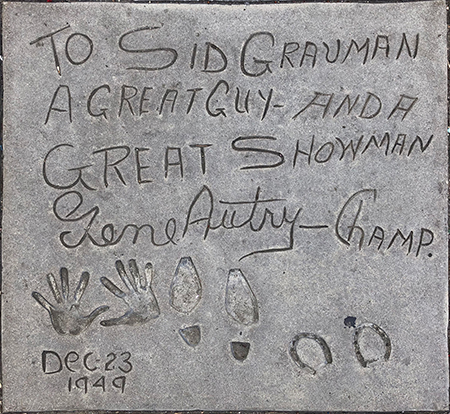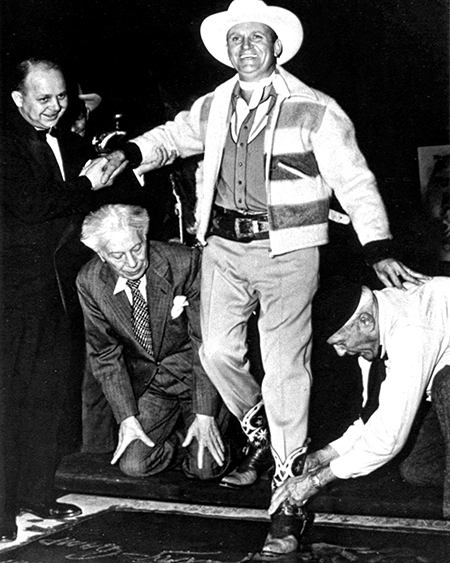 |
 |
|
|
| Gene Autry & Champion (Jr.) |
 |
| Forecourt Ceremony held on Friday, December 23, 1949 |
| |
Born: Orvon Grover Autry, September 29, 1907, in Tioga, Texas
Age at the time of the ceremony: 42
Died: October 2, 1998, in Studio City, California, age 91
Born: Champion Jr., in 1942, probably in Los Angeles, California
Age at the time of the ceremony: 7
Died: August, 1977, in Los Angeles, California, age 30 |
| |
Gene Autry was the famous singing cowboy and songwriter, star of countless western musicals, recordings, and television shows. Autry amassed a great fortune in broadcasting and sports, eventually opening a museum dedicated to western culture. He became a legend.
Born in North Texas, Autry's Methodist preacher father moved the family to a ranch in southern Oklahoma, where Gene worked while still in school. Gifted with singing and playing the guitar, young Gene performed at local dances. As a telegrapher on the night shift, Autry would sing to himself to while away the time; one night Will Rogers heard the young man sing, and encouraged him to sing professionally.
Autry lit out for New York and attempted to get a contract with Victor Records, but was turned down. Autry returned to perform at local radio stations in Oklahoma, and began to make recordings, signing with Columbia Records in 1929. He worked a radio program called National Barn Dance out of NBC Blue affilliate WLS in Chicago for four years, forming a team of sorts with Smiley Burnette.
Mascot Pictures producer Nat Levine put Autry in a quartette and had them perform a number in the film In Old Santa Fe (released in November 1934). Impressed with the fellow, Levine starred Autry in a 12-part serial, The Phantom Empire (released in February 1935). Autry co-wrote all the songs in this serial, and appeared with Burnette and his own horse, Champion. When Mascot was folded into Republic Pictures, Autry began crankin' films out: Sagebrush Troubador (released in December 1935), Guns and Guitars (released in June 1936), Rootin' Tootin' Rhythm (released in May 1937), and Man from Music Mountain (released in August 1938) to name but a few.
His classic recording of the song he co-wrote with Ray Whitley, "Back in the Saddle Again" was first sung by Autry in the film Rovin' Tumbleweeds (released in November 1939). After he recorded the song, it became a huge hit; Autry used it as his theme song for the rest of his life.
In 1940, after starring in many movies, Autry took to the airwaves with his variety program, Gene Autry's Melody Ranch, running until 1943 and from 1945 to 1956 over CBS. Melody Ranch was also the name of a movie (released in November 1940), and later, Autry purchased a movie backlot in Newhall and named it Melody Ranch. He sold it in 1990, and it is still a movie ranch. It was on the radio that Autry developed "The Cowboy Code:" rules of fair and honest behavior for his young listeners to live by.
Autry, an experienced pilot, enlisted in the US Army Air Corps during World War II. Rising to the rank of flight officer, he flew C-109 transport planes on the famous "Hump" airlift over the Himalayas between India and China.
Autry's original horse, Champion, passed away during World War II. After the war, with Autry returning to film work, Champion Jr., a highly-trained sorrel-colored gelding was brought forward, making his debut in Soiux City Sue (released in November 1946); Autry and Champion Jr. made a personal appearance together at Madison Square Garden that year. Autry also owned a large operation which raised horses for rodeos around the country.
Also in 1946, Autry became the Grand Marshall of Hollywood's Santa Claus Lane Parade, which inspired him to write the song "Here Come Santa Claus." His recording of it went off the charts in 1947. His covers of Christmas songs "Frosty the Snowman" and "Rudolph the Red-Nosed Reindeer" are indelible in the minds of all who hear them.
In 1950, Autry starred in and produced The Gene Autry Show for CBS television. Running until 1956, Autry was the star of various western adventures, attended by his sidekick, Pat Buttram, or Chill Wills, or Alan Hale, Jr. Autry produced other shows as well: Annie Oakley (1954-1957), The Range Rider (1951-1953), The Adventures of Champion (1955-1956), and Death Valley Days (1952-1970).
Retiring from the screen in 1964, Autry began to collect radio and television stations, bought back the rights to all of his films, planned to make a western musuem at Melody Ranch, but it burned, so the museum would have to be located in Griffith Park (now called the Autry National Center), eventually became the owner of the California Angels baseball team, and generally amassed a fortune. He died at his home in Studio City of lymphoma in October 1998 at the age of 91. |
|
|
|
|
| |
 |
 |
| Grauman's Chinese Theatre, Hollywood, California. Gene Autry and Champ Forecourt block. Executed by Jean Klossner, Friday, December 23, 1949. 50 x 46 inches. |
 |
 |
 |
| Grauman's Chinese Theatre, Hollywood, California. Gene Autry Forecourt ceremony, Friday, December 23, 1949. Theatre manager George Kane holds Gene Autry's hand while Sid Grauman observes as cement artist Jean Klossner makes the impression of Autry's boot. |
|
 |
|